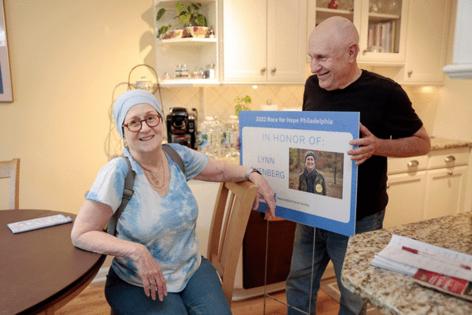Could a deadly brain cancer someday be managed like a chronic condition? These researchers think so
Published in Health & Fitness
PHILADELPHIA -- Every two days, Lynn Oxenberg leans over her bathroom sink while her husband shaves the shadow of auburn hair beginning to cover her head.
Once clean shaven, she sticks to her scalp four tan patches with electrodes designed to keep aggressive cancer cells from growing in her brain.
She stuffs the protruding wires and a two-pound battery into a mini backpack, then heads to the grocery store, or library, or lunch with friends.
This has been Oxenberg’s routine for six years. It can be arduous, but it’s kept the 73-year-old Elkins Park, Pennsylvania, grandmother alive far longer than most people diagnosed with glioblastoma, an aggressive brain cancer that kills in an average of 15 months.
Penn doctors are now researching whether the treatment routine, paired with highly sensitive MRI monitoring, could one day make Lynn’s experience — living with glioblastoma for years — less of an anomaly.
There is no cure for glioblastoma, and the disease is exceptionally difficult to treat. Glioblastoma is typically treated with a combination of surgery, radiation, and chemotherapy, then monitored closely for signs the cancer is growing again. Once the cancer begins to regrow, it is almost always fatal. Surgery, chemotherapy, and radiation can never eliminate all of the cancer because glioblastoma tumors burrow into brain tissue like an octopus’ tentacles.
Penn researchers are testing whether they can help glioblastoma patients, who have already had surgery and other treatment to reduce the size of their tumor, to live longer by pairing the Tumor Treating Fields (TTF) therapy Oxenberg uses with artificial intelligence-powered MRIs that take a tumor’s “temperature” for highly precise results.
The combination departs from the standard of care for the disease. Instead of waiting for the disease to return and treating it with more chemotherapy or radiation, TTF therapy, made by Swiss pharmaceutical Novocure, constantly sends electric fields through the brain to keep cancer cells from growing. The temperature-taking MRIs can show the earliest signs that a tumor is returning, and help doctors swiftly pivot their care plan.
Suyash Mohan, Penn’s director of neuroradiology research, calls it a “whole brain” treatment that could be more effective than attempting to isolate a tumor that can never be fully eliminated. The TTF therapy keeps cancer cells in check, and the highly detailed MRIs can help make quick changes to treatment, if necessary.
Novocure’s FDA-approved TTF therapy device, Optune, has shown modest results in extending life spans for glioblastoma patients. Patients in Novocure’s phase 3 trial who wore the device 70-80% of the time lived an average of 21 months, compared to 15 months among patients who received standard treatment. But the device can be cumbersome: Patients must shave their heads to glue electrodes in place. Unlike medications that remain in the body hours or days after being taken, Optune only works when being worn.
...continued
©2024 The Philadelphia Inquirer, LLC. Visit at inquirer.com. Distributed by Tribune Content Agency, LLC.












Comments